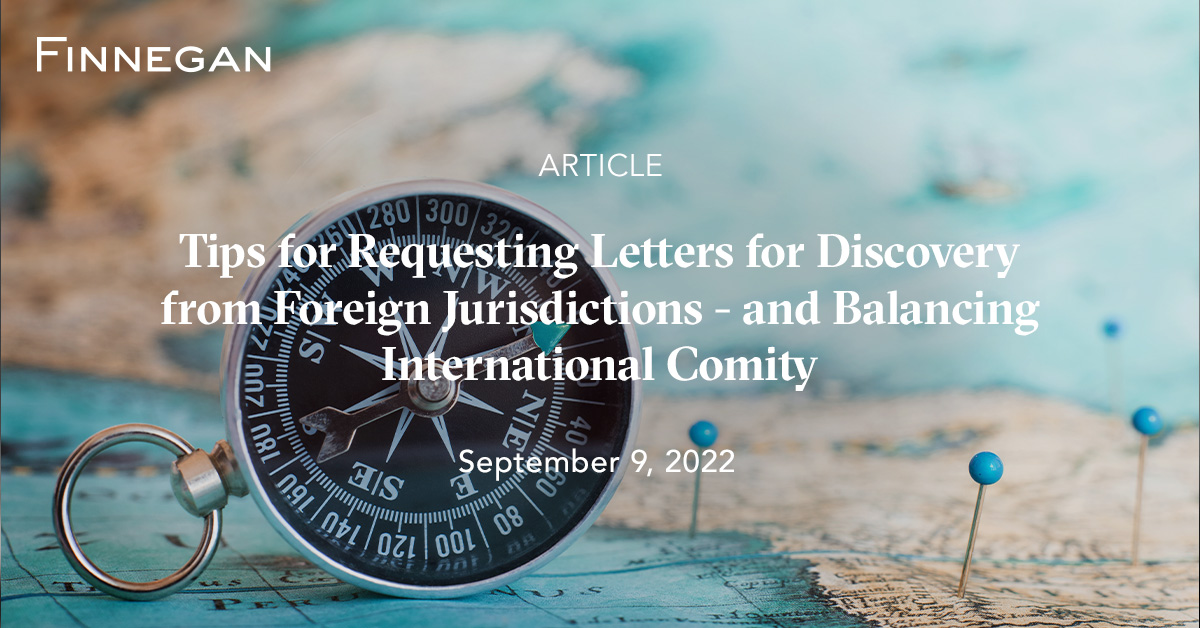The Process Involved in Filing Letters Rogatory: A Step-by-Step Guide
The Process Involved in Filing Letters Rogatory: A Step-by-Step Guide
Blog Article
The Duty of Letters Rogatory in International Legislation: Secret Insights
Letters rogatory serve as a critical tool in worldwide legislation, promoting cross-border legal help by permitting territories to officially ask for proof and activities from one an additional. What effects might these challenges have for future legal process?
Interpretation of Letters Rogatory
In the realm of international legislation, letters rogatory work as official requests issued by a court in one territory to look for aid from a court in an additional territory. Letters rogatory. These requests are specifically considerable in cross-border legal process, where the enforcement of a court's order or the gathering of evidence might be hampered because of jurisdictional constraints

The process usually needs the asking for court to verbalize the particular info or action required from the international court, adhering to the lawful methods and conventions established between the territories entailed. As soon as released, the letters rogatory are sent via polite networks, which may include consulates or embassies, to make certain that the request is acknowledged and acted upon by the international court. In general, letters rogatory exemplify the cooperative framework necessary for reliable global legal procedures.
Historical Context
Although the method of letters rogatory has ancient roots, its formalization within the framework of global legislation emerged considerably in the 20th century. Historically, such ask for judicial assistance were utilized in numerous legal traditions, consisting of Roman law, where they assisted in cross-border collaboration in legal issues. The idea acquired restored attention with the surge of globalization and the boosting intricacy of worldwide legal communications.
The mid-20th century saw the facility of treaties and conventions that sought to systematize the procedure of letters rogatory. Especially, the 1970 Hague Convention on the Taking of Evidence Abroad in Industrial or civil Issues offered an organized technique, improving the efficiency of these requests - Letters rogatory. This duration noted a change from informal setups to a more methodical structure, which addressed the difficulties presented by differing nationwide legal systems
As states came to be extra synergistic, the need for efficient mechanisms to gather proof throughout borders emerged, reinforcing the function of letters rogatory in facilitating international teamwork. Today, they remain an essential instrument for acquiring proof and ensuring that justice goes beyond nationwide boundaries, showing the developing nature of worldwide regulation in reaction to international obstacles.
Refine of Issuing Demands
The process of issuing letters rogatory generally includes numerous vital steps made to guarantee that ask for judicial support are clear, specific, and compliant with both domestic and worldwide lawful criteria. Initially, a celebration seeking help must prepare an official demand that outlines the important truths of the situation, the relief sought, and the details evidence or testament required. This record must be crafted with precision to fulfill the legal demands of the jurisdiction in which it will be submitted.
Adhering to the preparation of the demand, it is submitted to the ideal authority, frequently a court or a marked governmental firm. This authority examines the check that demand to ensure it follows Resources legal requirements and procedural norms. As soon as approved, the request is transmitted to the international jurisdiction with polite channels.
Upon receipt, the foreign court reviews the request's compliance with its neighborhood regulations and methods (Letters rogatory). If approved, it proceeds to perform the request, which may involve the issuance of subpoenas or the collection of evidence. Throughout this process, preserving clear interaction between the requesting and receiving territories is important to guarantee successful teamwork and the gratification of the request
Obstacles and Limitations
Difficulties and constraints regularly arise in the procedure of implementing letters rogatory, commonly originating from varying legal systems and treatments in between jurisdictions. One significant barrier is the differing criteria of admissibility for proof, which can result in difficulties in the acceptance of documents requested with letters rogatory. Additionally, the absence of uniformity in legal terminology and interpretations can create misconceptions, complicating interaction in between courts in various countries.
Moreover, delays are typical because of bureaucratic procedures, as the request may require to go through numerous layers of legal authorities before it is satisfied. In some circumstances, the asked for jurisdiction may do not have the needed resources or desire to comply, additionally preventing the procedure. Language barriers also contribute to difficulties, as precise translation of lawful papers is vital for making certain that the designated message is shared without distortion.
Finally, sovereignty worries might develop, as some states hesitate to adhere to demands that they regard as infringing upon their legal autonomy. These difficulties highlight the complexities inherent in making use of letters rogatory, necessitating better harmonization and participation amongst worldwide legal systems to enhance their effectiveness.

Effect on International Participation
Recognizing the significance of letters rogatory in cultivating international participation is vital, as these requests help with cross-border lawful help and promote joint efforts in criminal and civil issues. By allowing one jurisdiction to formally request aid from one more, letters rogatory produce a structured legal structure that boosts the performance of worldwide communication between judicial authorities.
Using letters rogatory helps to establish shared trust and regard amongst countries, which Recommended Site is important in a progressively interconnected globe. They function as a mechanism not only for collecting proof yet also for guaranteeing that lawful processes are upheld across borders. This is particularly important in combating transnational criminal activity, where the failure to secure collaboration can threaten justice.
Furthermore, the reliance on letters rogatory can streamline complex lawful procedures, minimizing delays and uncertainties in global investigations. The step-by-step safeguards fundamental in this process add to the protection of individual civil liberties while helping with teamwork amongst states. Inevitably, the effect of letters rogatory on worldwide teamwork highlights their function as important devices in the promotion of justice, promoting a collaborative spirit that transcends legal systems and nationwide borders.
Conclusion
Finally, letters rogatory act as an important instrument in global regulation, promoting cross-border lawful support and participation. Despite intrinsic difficulties such as varying bureaucratic delays and legal standards, their standardized procedures promote trust amongst nations. The continued development of these mechanisms is necessary for improving the performance of international lawful procedures, inevitably fostering stronger collaboration in both civil and criminal matters across jurisdictions. The importance of clear communication in this context can not be overemphasized.
Letters rogatory serve as an essential tool in worldwide legislation, promoting cross-border legal assistance by permitting jurisdictions to formally ask for proof and activities from one an additional.The procedure normally needs the requesting court to verbalize the specific info or activity required from the international court, sticking to the lawful protocols and conventions established between the territories involved. Historically, such demands for judicial assistance were made use of in different legal traditions, including Roman regulation, where they facilitated cross-border participation in legal issues.The process of providing letters rogatory generally involves a number of important actions designed to guarantee that requests for judicial help are clear, details, and certified with both international and domestic legal criteria.Furthermore, hold-ups are common due to administrative processes, as the demand may need to pass through several layers of lawful authorities prior to it is satisfied.
Report this page